-
Waiting for me while waiting for a massage. By the end of this week and the rain it’s bringing, I hope the ducks will be here for real!
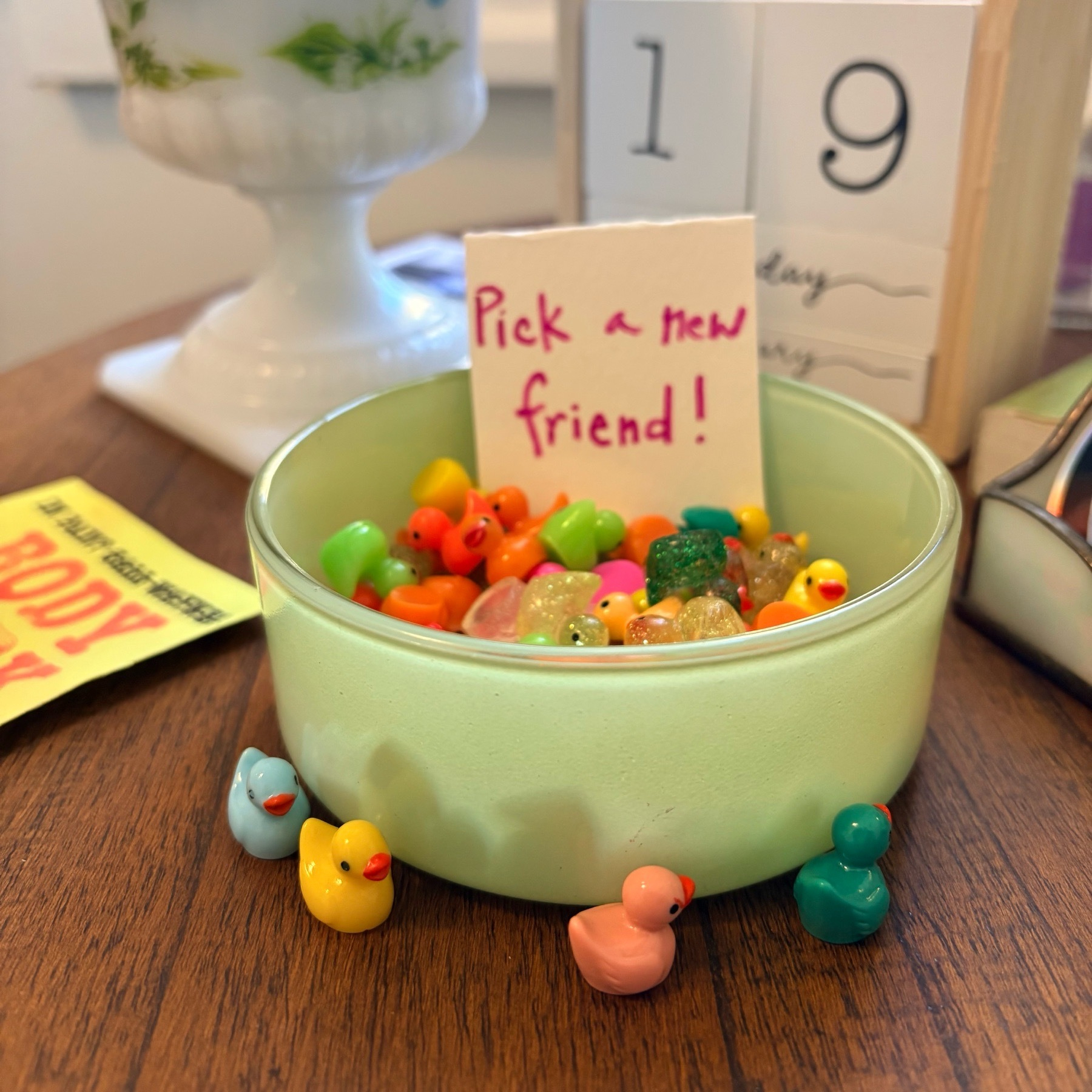
-
Seen on my morning walk to the cafe. I’d say it’s a fairly common sentiment this weekend after a week long street parking ban. 🌨️🚗

-
The attack on Iran today, February 28th, 2026
I am absolutely disgusted with my country right now. This attack on Iran is morally and politically bankrupt, and will do nothing but confirm for the rest of the world why they are better off without the US.
This “regime change” that they talk about, will have consequences for us down the road. But what do our leaders care? They won’t be around to see the outcomes. The dust will settle on the poor, the maimed, the downtrodden, and the powerless, and our leaders will blame them for being filthy. They will jeer at the opposition to clean up the mess if they care so much, they’re too busy making the world in their funhouse mirror image.
They do not understand - you do not bring about your goals by preparing the way for it. Preparing the way for it is how you bring about your goals. Practicing peace and prosperity is how you bring about peace and prosperity. This will do nothing but salt the earth we live on.
-
This storm is wild, everyone. It’s shaken the building in just the right way to make me think a window or door has slammed open, all night long.
The snowball fight tomorrow is gonna be epic, though!
-
Someone left googly eyes behind yesterday at my favorite tea shop. The staff knew what to do!
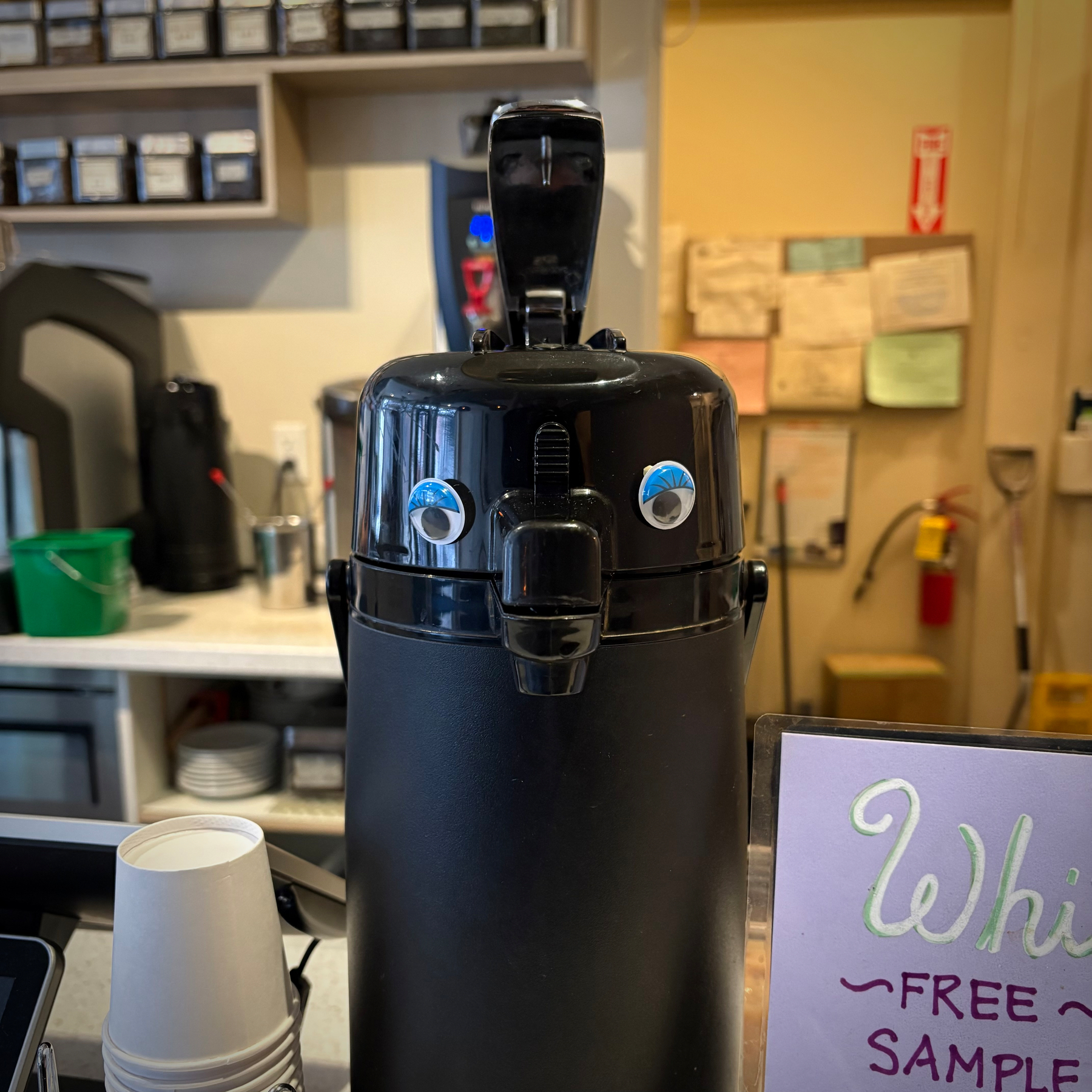
-
The FreakQuencies open with a new cover song and a full house!

-
After half a week of what felt like nothing but pointless meetings, I have two days when I can just focus at work and get projects finished.
The empty stretch on my Outlook calendar stares back at me, as if daring me to take action. As if it knows how to parry any attack I make. The catch-up-on-documentation pose? How quaint, when it has the layout-updates and queue-cleanup riposte. I can’t counter without leaving my documentation exposed, though!
Well, I’m gonna get cut no matter what I do. Might as well get started.
-
I was worried the book club would be sparsely attended tonight, or that I might be the only one. I’d messed up the date in the announcement, and didn’t realize my error until sending the reminder.
It ended up being one of the better attended ones, and with a great discussion too. It was less about the book and more what defined “psychoanalysis”, but aren’t some of the best discussions borne of tangents from the topic?
-
Snowmageddon 2026!
Drove around Providence on a last minute errand before the snow, and the streets were eerily empty. Other than the middling streetlights, beaurocratically working as if it were a sunny Sunday, I could drive freely and without the usual traffic. It reminded me of the beginning of the COVID lockdown, only with an air of anticipation and expectation, not hesitation. During COVID, the people didn’t know what the air would bring; this morning, the only uncertainty was how much of a workout the shoveling would be.
Businesses are handling this in stride. My favorite tea shop decided to open for as long as they felt like it. But now I’m home, cooking a stew and doing some laundry, before I settle in for some tea and a good book.
-
There is a woman catching up with a friend at this cafe, with an amazing laugh. I don’t want them to think I’m eavesdropping, because I’m not, but every time she laughs it takes effort for me to not join in.
And she just left, off to make someone else’s day brighter, I hope.
-
This month just continues to get worse and worse. Now my DnD campaign lost a decisive battle. Heck, our efforts to stop the BBEG ended up helping him.
Remind me to hibernate for January of 2027, would ya? 🎲⚔️
-
Between sickness, allergies to medication, isolation, cancelled plans and ruined routines, January has turned into the kick in the butt I needed to get working on moving out of Providence. All the comforts that kept me complacent faded, and what’s left shows me I’m not where I’d like to be.
-
There comes a point where people will take advantage of the standards you hold yourself to.
I’m still learning how to take the L to my pride, and take the W to my self respect.
-
Becoming the Coyote: Lessons from a Year of Survival
Annalise’s photography is even better than her writing. This essay reflecting on some hard times and hard lessons in 2025, and connecting them to her encounters with coyotes in her wildlife work, is a statement about resilience and adaptability, and a plan for a path forward we call can learn from.
I’ve followed Annalise for a very long time, since we were mere acquaintances in early aughts blogging networks. We’ve never been close in any sense of the word, never more than very distantly engaged with each other through the pre-web2.0 era and that only briefly, but I’ve always enjoyed following her, as she’s claimed her life and followed her passions. She’s one of the people who, just by living her life, inspires me to keep trying in mine. It’s good to have such people tangentially in your life, not as a replacement for real and in-person connections, but as a source of admiring inspiration, someone who makes your heart say, “Good, I’m glad they’re doing well and still going, good on them,” and raise a glass in distant salute.
If you have such people in your life, who you’d never talk to but feel inspired by, raise a glass in their honor today and consider how they can inspire your life. It’s a good way to spend a Sunday morning.
-
Why I did not go into medicine.
Recently, a two-day flu has been going around my part of the globe. It sucks for 48 hours, then you feel better. I didn’t think much of it at first, just made sure to stock up on medicine, soup, and tea.
A week later, and I was still suffering. My chest was tight, my throat raw and inflamed, my coughing irrepressible. Why? Was it something more? A COVID test came back negative, upping the medication did nothing. Only last night did it hit me: all my cough suppressants and over-night flu medications were cherry flavored. I’m allergic to stone fruit.
Half a day after replacing my medicine, and I’m already feeling 1,000% better.
I am a smart person. I promise.
-
Poker Face, Season 1 ⭐⭐⭐⭐︎
[Poker Face, Season 1 ⭐⭐⭐⭐︎
There’s nothing I don’t like about this series - the acting, the cinematography, the Columbo-style mystery format with a Jester-esque character, the sympathetic take on the transient underclass in America. The guest stars are given a chance to shine in roles they absolutely relish, which works perfectly for a show where the twists and drama are character driven more than plot driven. If you liked Knives Out, you’ll like this show.
Am I going to rush to the next (and final) season? Not really. It feels like a show you can pick up on when you need a quiet comfort show, and I think that’s why it didn’t get renewed. It many ways, in feel, execution, and style, it’s a homage to a different era. Monk, a more recent long-running murder-of-the-week show, worked for many seasons as comfort show too, but in a way it was as much an extended riff on Monk’s mental illness and trauma as it was a mystery-of-the-week. People came to watch Tony Sholub play weird but lovable Adrien Monk, who is a mess in a funny way. Poker Face doesn’t have that, which makes it better material in my opinion, but also means it lacks a look-at-this-mess hook. Even the overarching motivating plot, which I won’t spoil here, isn’t presented as a source of major threat in every episode, other than providing some tension and plot devices to make the murder solving more interesting. I’ll watch Natasha Lyon in anything; Benjamin Bratt is magnetic as Cliff LeGrand, and as I said, the guest stars in each episode are each worth double the price of admission. But these days? I don’t know if that matters as much. The greater viewing public wants spectacle that announces and demands our attention; Poker Face isn’t that.
It also could have ended after one season, very easily, with everyone getting their just endings, including Charlie. (Spoilers: she seems condemned to constantly clean up after messes she inadvertently makes.) A chance for all the actors and writers to shine, and maybe do it again with a different ensemble. The network execs want income streams, though, and a one-season show isn’t that.
I think Rian Johnson can get this show picked up for a miniseries or a relatively low budget movie, easily. A continuation of the series? I’m not sure. But if it does, I’ll give it a shot too. 📺🔪
-
Currently reading: The Perigrine, by J.A. Baker.
Sparrowhawks were always near me in the dusk, like something I meant to say but could never quite remember.
I’m only three pages in, and I already know I’d skip the once-a-year event I paid almost $100 to attend just to keep reading this. 📚💬
-
Finished reading: Strange Houses

Finished reading: Strange Houses by Uketsu
Strange Houses ended up being a dud, for me at least. It’s a good, tightly written book that I highly recommend, it just wasn’t for me.
I loved the use of architecture floor plans and visual aids to help the reader follow along, as if they were examining the sketches for themselves. Also, without spoiling the plot, the central cause of the drama is pretty creepy. The writing was just too on-the-nose, telling the reader instead of showing them and letting the mystery build. It might be a cultural or translation issue - maybe if I was raised in Japanese society, this story would affect me differently. As it exists now, it doesn’t compare well to Poe’s works, in my opinion.
I’m still glad I read it, and I happily recommend it! It was well written and translated, and it made for a nice and quick diversion from my reading list. If horror, mystery, or detective-like stories are something akin to what you prefer, pick it up, give it a shot! 📚
-
It’s a bitingly cold morning, too cold to use my phone’s camera, but trust me, the magic hour light right now is just chef’s kiss. 🌄
-
Never ordering delivery from IKEA again. A delivery late by several hours, and they think it’s perfectly ok. Next time, I’ll rent the damn delivery truck myself - it will be cheaper and on time.
-
I’m supposed to be reading Kinky History for book club, but I saw this in a bookstore last night and just had to pick it up. Mystery and architecture, in a 203 page book, by an enigmatic author? Don’t mind if I do! 📚
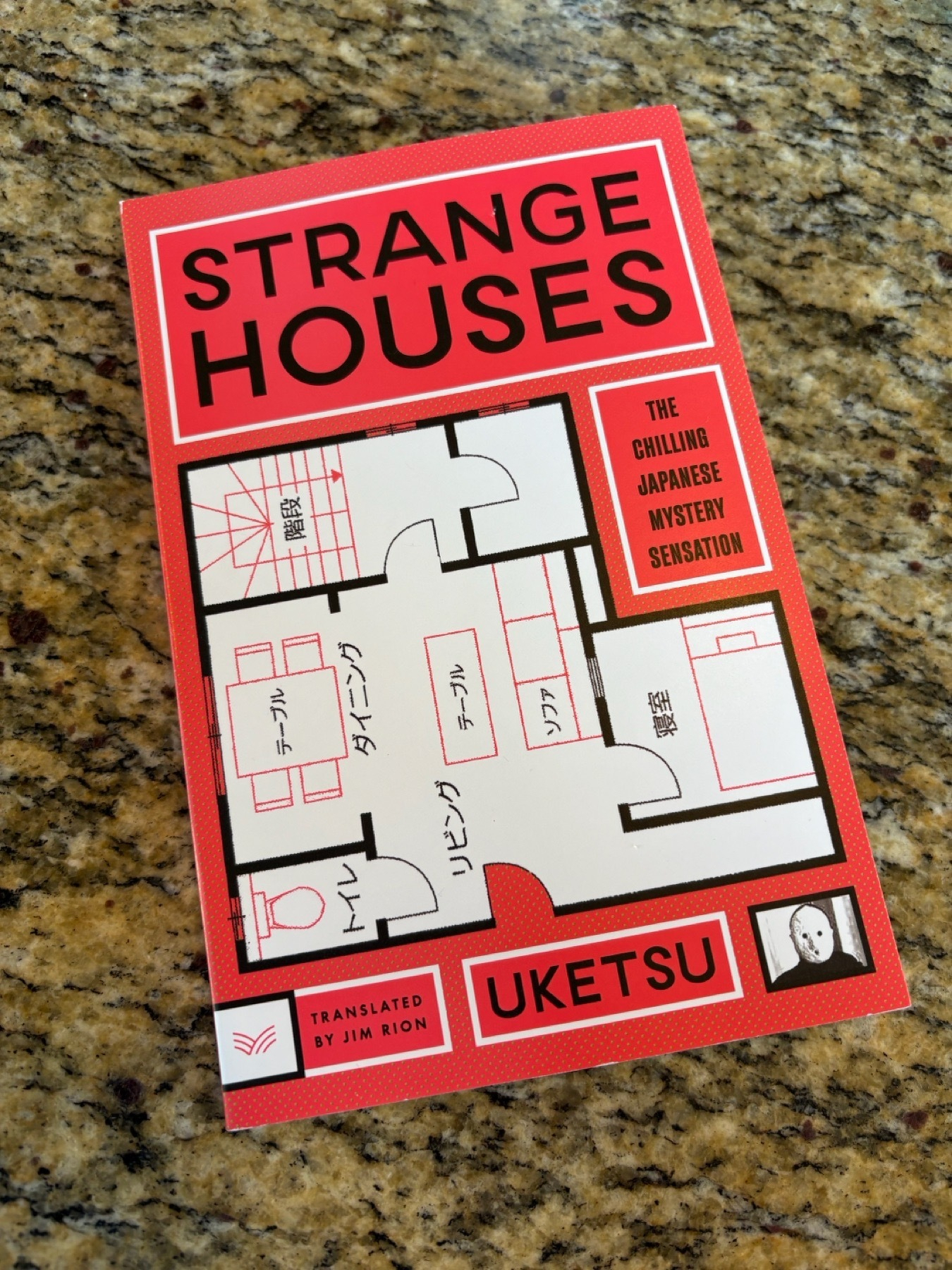
-
Lots of dreams about losing friends, a job, housing, yet still finding my footing and new friends. Still with the uncertainty and fear, but not ending with these. More like a series of small arcs in a larger story, than a depressing ending.
-
Catching up on Critical Role Season 4, and on top of that emotional rollercoaster of the overture, I’m beginning to wonder if Brennan isn’t channeling a little Milton and planning a Paradise Lost story for this campaign. It worked for Pullman and His Dark Materials, why not here? 📺🎲⚔️
-
I enjoy finding these sincere bits of gentle whimsy in my travels. ☕️
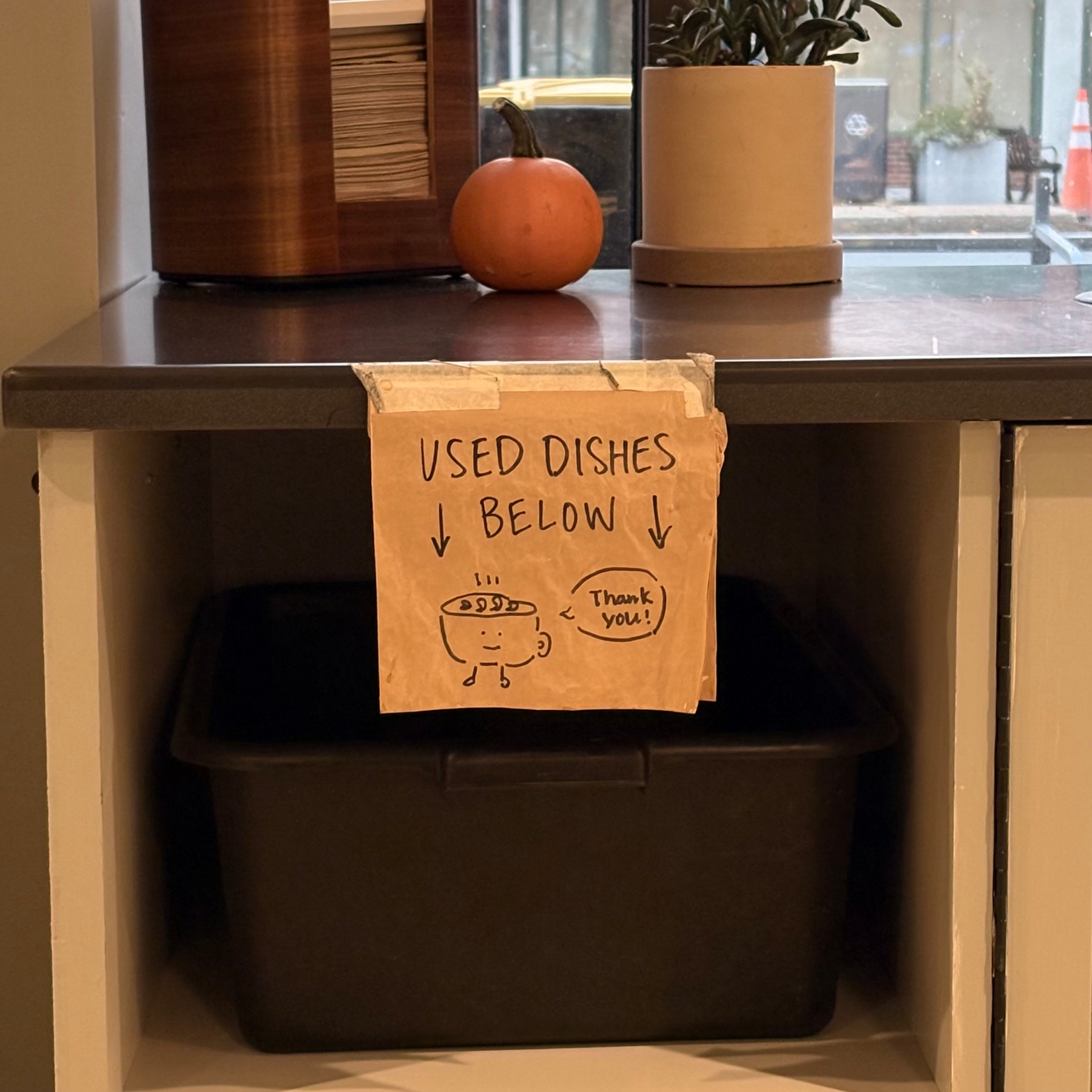
-
Accidental Connections poetry. 📝🧩
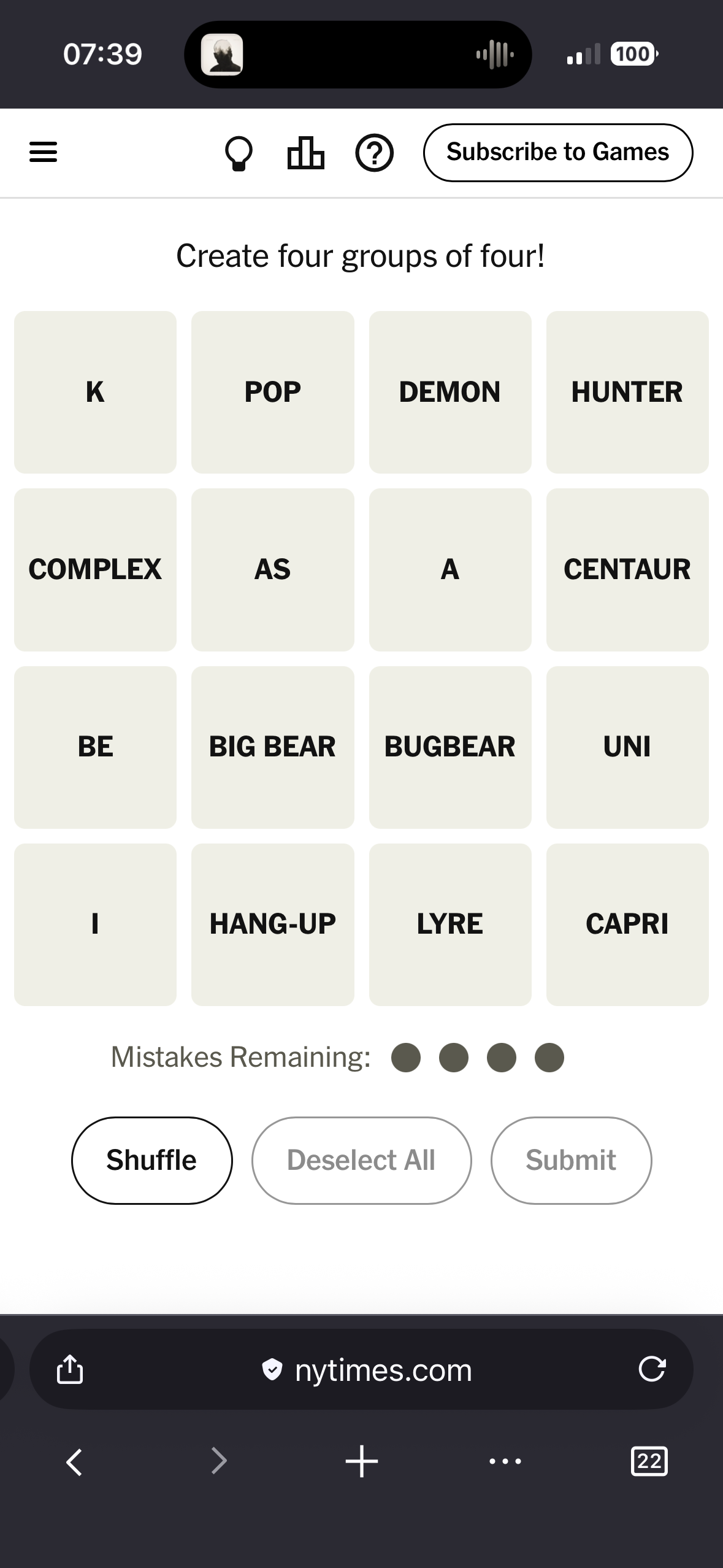
subscribe via RSS